Jacob Anderson and Sam Reid Are Ready For Their Interview
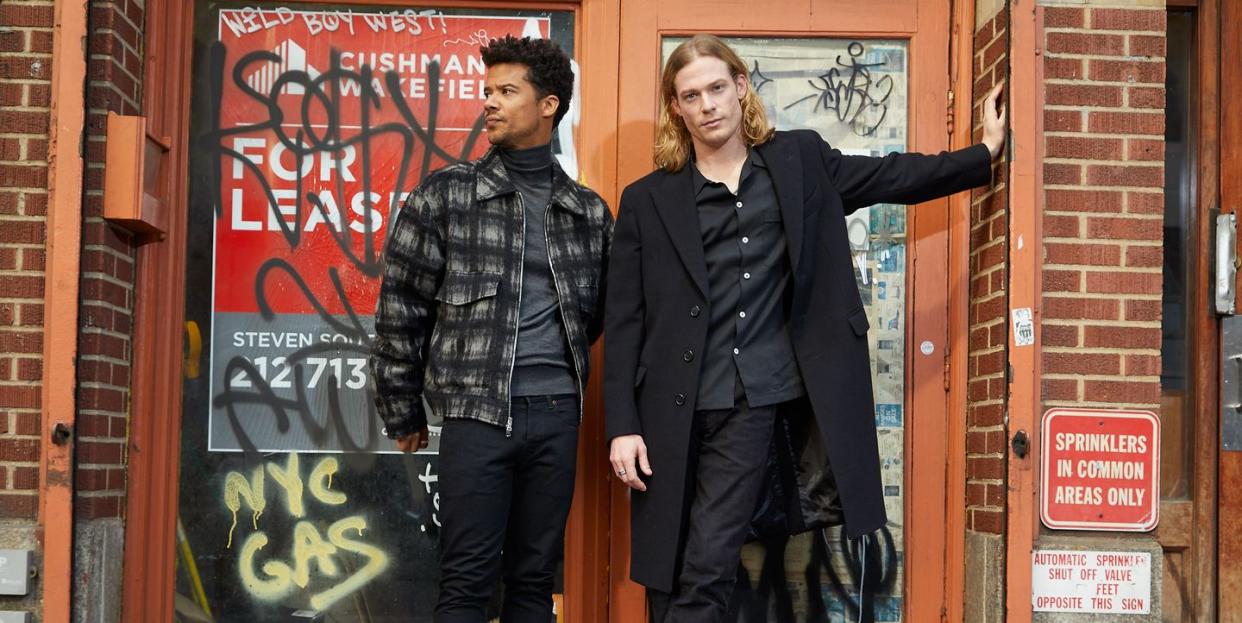
Gather round, members of the Anne Rice Fan Club. Today, we welcome two new members to the Board of Representatives: Jacob Anderson and Sam Reid, the stars of AMC’s sumptuous new adaptation of Interview With the Vampire. Their qualifications, you ask? Well, beyond donning the iconic fangs of Louis de Pointe du Lac and Lestat de Lioncourt, these two superfans have started their own on-set book club, talking about Rice every day as they devour her twelve-volume magnum opus, The Vampire Chronicles. Zooming with Esquire from England and Australia, their reverence for these genre-defining novels is palpable, as is their desire to make inroads with the late author’s cultishly devoted fanbase. “I hope that her readers will accept us,” Reid confesses.
There’s good reason to fear that they may not. Back in 1994, a splashy film adaptation of Interview With the Vampire ran afoul of Rice’s readers, with thousands gathering in the rain to protest the casting of Tom Cruise as Lestat. Co-starring Brad Pitt as Louis, the film has since gained cult status, but fans recognize it as a colossal failure for its watered down take on the novel’s bold eroticism; reviewing Interview With the Vampire on Saturday Night Live’s Weekend Update, Norm MacDonald panned it with the simple criticism, “Not gay enough!” No such criticism can be lobbied at the newer outing. AMC’s adaptation is Interview With the Vampire as readers know and love it—opulent, graphic, and unabashedly erotic. “You have to know that these two people are in love,” Anderson tells Esquire. “Being in love is complicated and beautiful and messy.”
Rice’s 1976 novel unfolds as a conversation between reporter Daniel Molloy and Louis de Pointe du Lac, a tormented vampire who confesses his centuries-long life story. That context exists in the AMC series, with an added layer from the mind of showrunner Rolin Jones: this time around, the frame story takes place when Louis invites Molloy to a do-over interview, determined to correct the record nearly fifty years after their first conversation. Jones has taken other imaginative leaps with Rice’s novel: the bulk of the story is set not in the colonial New Orleans of 1791, but rather in 1910. In this roaring city, Louis is not a white Creole plantation owner, as in Rice’s telling, but a Black businessman running a saloon in the red light district, where he wrestles with his sexuality and faces countless racist brutalities. "You could be a lot of things in New Orleans," he narrates. "But an openly gay Negro man was not one of them."
Playing Louis as both alive and undead across multiple centuries, Anderson grounds his performance in poignant pain, regret, and deep humanity. Meanwhile, Reid dazzles as Lestat, the mercurial and magnetic vampire to whom Louis succumbs. "He was my murderer, my mentor, my lover, and my maker," Louis tells us. Reid also puts the brattiness back into Rice’s iconic Brat Prince, tossing off some of the series’ best lines with shrugging aplomb. “What can I say? I’m a lot,” Lestat quips. Together, the actors’ chemistry is electric, buoyed by their off-screen friendship. As these two bloodsuckers fight and fornicate, it all makes for enthralling television. “Let the tale seduce you, just as I was seduced,” Louis advises Molloy. It’s as good a thesis statement for Interview With the Vampire as any.
Anderson and Reid took us behind the scenes of the series, from their love of Anne Rice’s books to one very memorable sex scene. This conversation has been edited for length and clarity.
ESQUIRE: What attracted you to these characters?
Jacob Anderson: I felt that Louis related to being a vampire in the same way that I relate to being a human. He's tortured by what the meaning of his existence is, what his code is, what he believes in. You don’t see characters like Louis very often. They don’t often get to be the hero.
Sam Reid: What I love about Lestat is that he has all these dark layers, but really, the way that he shows violence is through love. It’s a very backwards way of coming at a monster. Lestat always starts with a deep attraction or deep love for someone, then becomes quite sadistic in the way that he approaches those relationships. These are Anne Rice monsters, so they're from the Mary Shelley tradition where there's so much humanity within them. He’s a monster who loves first—he wants to be accepted and appreciated, and therefore adored and worshiped. He's not trying to scare anybody. He's trying to get you to fall in love with him. He’s the antagonist, in a way, but you also understand him because he's often coming from a good place.
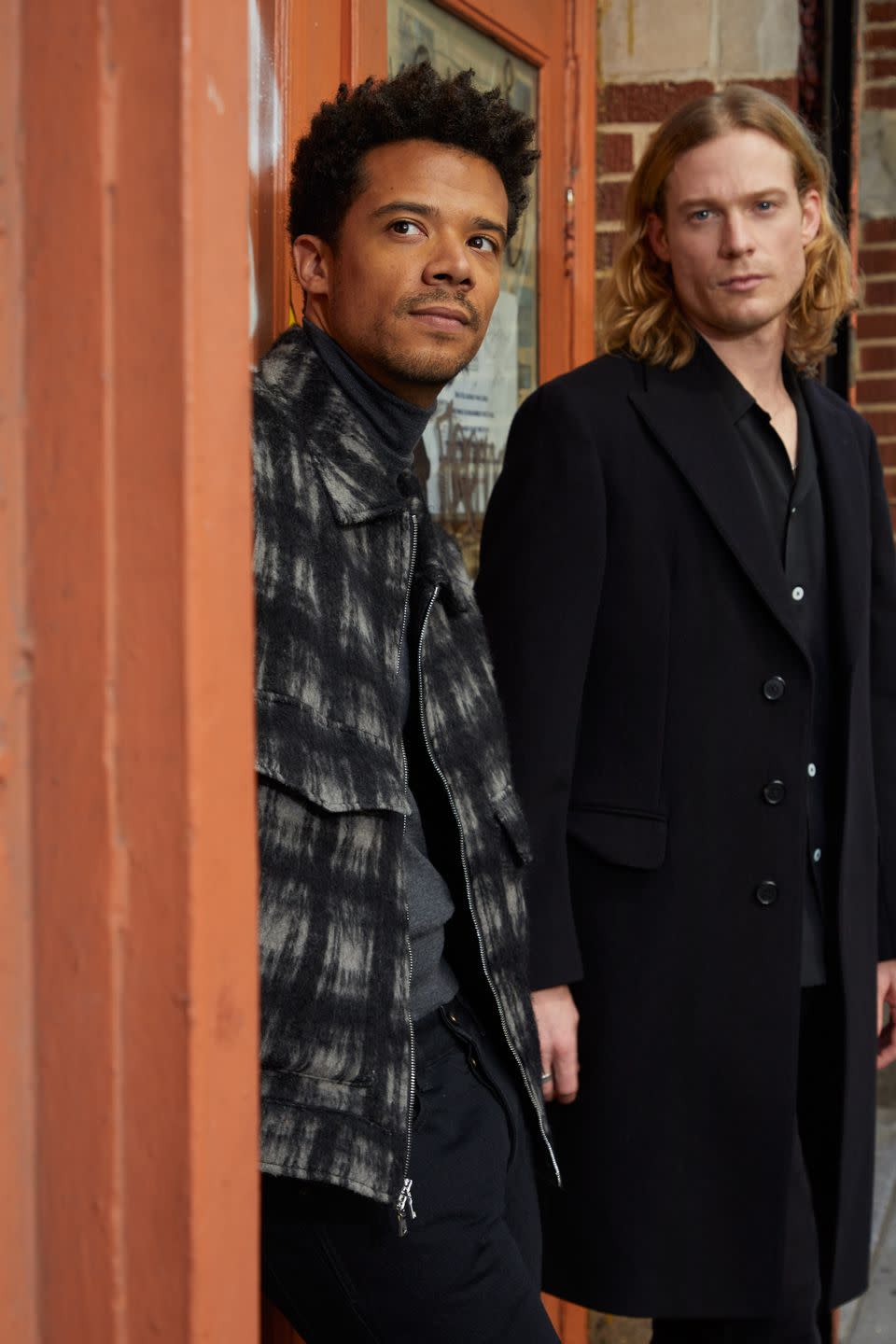
Somehow he’s coming from a very human place, even though he’s not human.
SR: That’s the thing—these vampires hold onto their humanity in different ways. Lestat holds onto his humanity through his love and his muses.
At one point in the show, Daniel Molloy describes Louis and Lestat’s relationship as having an “abusive dynamic,” saying that they’re “locked in some fucked up Gothic romance.” Do you think there's truth to that description?
JA: I think there's truth to both parts of that. There are things about their relationship and their dynamic that are undeniably abusive. But there are ways in which, at least to Lestat, Louis's withholding of his love is a form of abuse or cruelty. They're really cruel to one another, but they have this deep connection that neither of them can really articulate. They’re trapped in each other.
SR: There’s also the vampire bond, which is basically impossible to break. Claudia is made from this sort of bond, but she's made from a different place. It’s not just the making of another vampire that connects them deeply, but it’s the way that it’s done and the choice of the person you turn—all of these things create the ultimate cocktail of immortal companions. Louis and Lestat are tied together in a way that they cannot break. The show looks for the real relationship all the time, with Molloy there to say, "What’s really going on here? Is Louis telling the truth about what happened?"
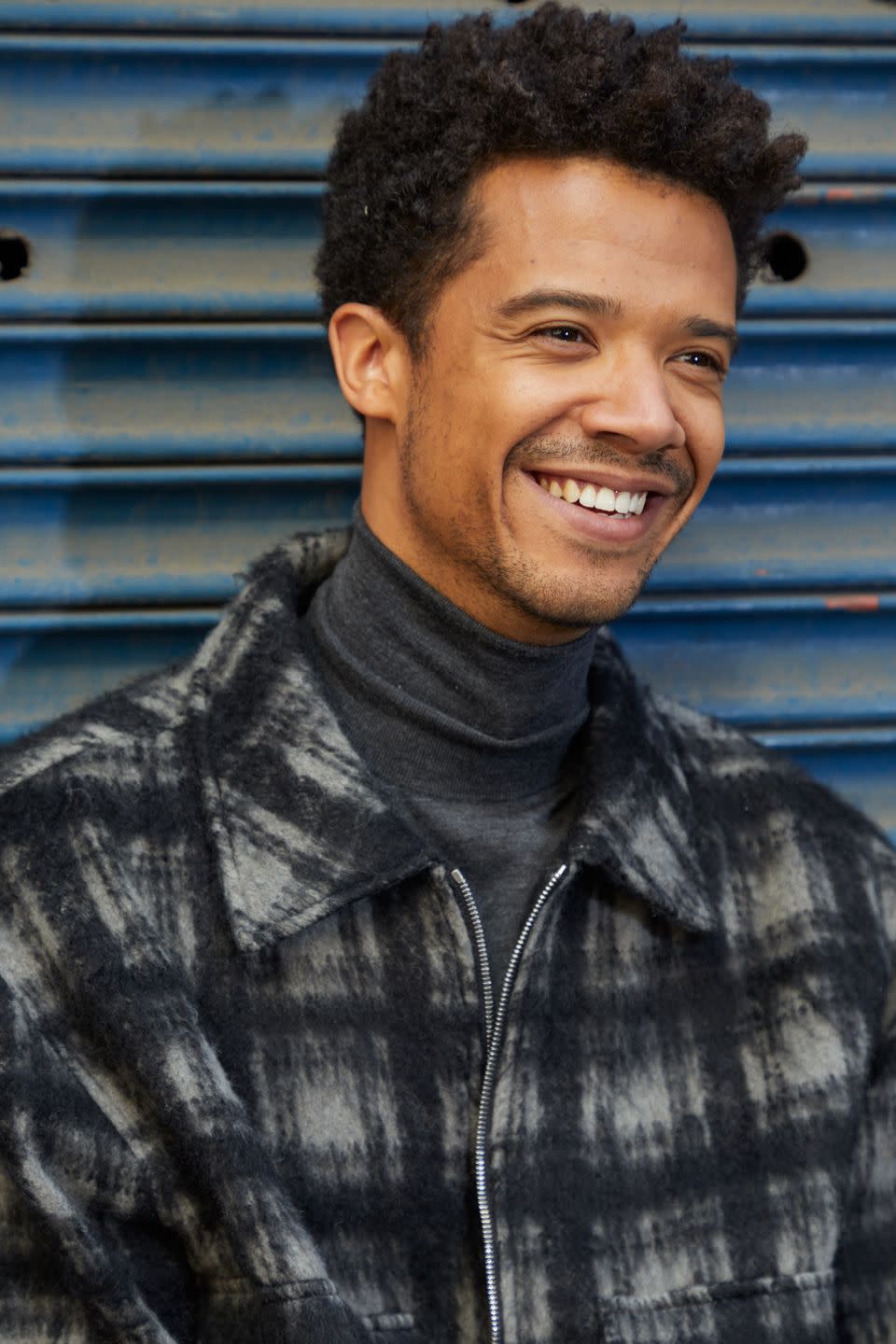
Jacob, was that on your mind as you were filming scenes set in the past?
JA: There are things that subconsciously you're thinking about all the time, and then things that you just understand and bury. I got some helpful cues from Rolin [Jones, showrunner], but really, I just chose what Louis was aware of—what was a manipulation and what wasn't. Part of the dynamic between Louis and Molloy is that the interview isn’t going how he planned it to go. He has a narrative he wants to push, and he didn’t expect to be questioned. Louis sees a bit of himself in this elderly man, and that’s quite a confronting thing for a detached 147-year-old vampire. As the season goes on, you’ll start to see Louis question his own memories.
The 1994 film adaptation of Interview With the Vampire shied away from depicting the romance between Lestat and Louis. Your adaptation is very explicit; at one point, we even see Lestat and Louis have sex while levitating. Rolin Jones described this series as “an excitable, aggressive, toxic, beautiful love story.” What did that mean to you, finally getting to tell the story in its full, explicit sensuality?
SR: I was very happy it was going that way, because it wouldn't be Interview With the Vampire if it didn't. It’s really important that we explored that, because a big part of their relationship is this intense connection. Anne Rice describes drinking each other's blood as incredibly erotic, almost like having sex. So how do you translate that on screen? I guess nude levitation translates quite well. I think it's really important that we don't shy away from it, because if we spend the whole season going, "Will they? Won't they?," we don't get to the really interesting parts of this complex relationship. Getting straight down to it means we can look at the dynamics of this pair—how they hurt each other and how they build each other up.
JA: With the levitating scene, we talked a lot about how you need those moments of joy and excitement and romance so it's not all about tortured Catholic guilt. We've seen vampire stories told that way before, and like Sam said, you then can't get into the messiness of their relationship. You have to really believe. You have to know that these two people are in love. Being in love is complicated and beautiful and messy.
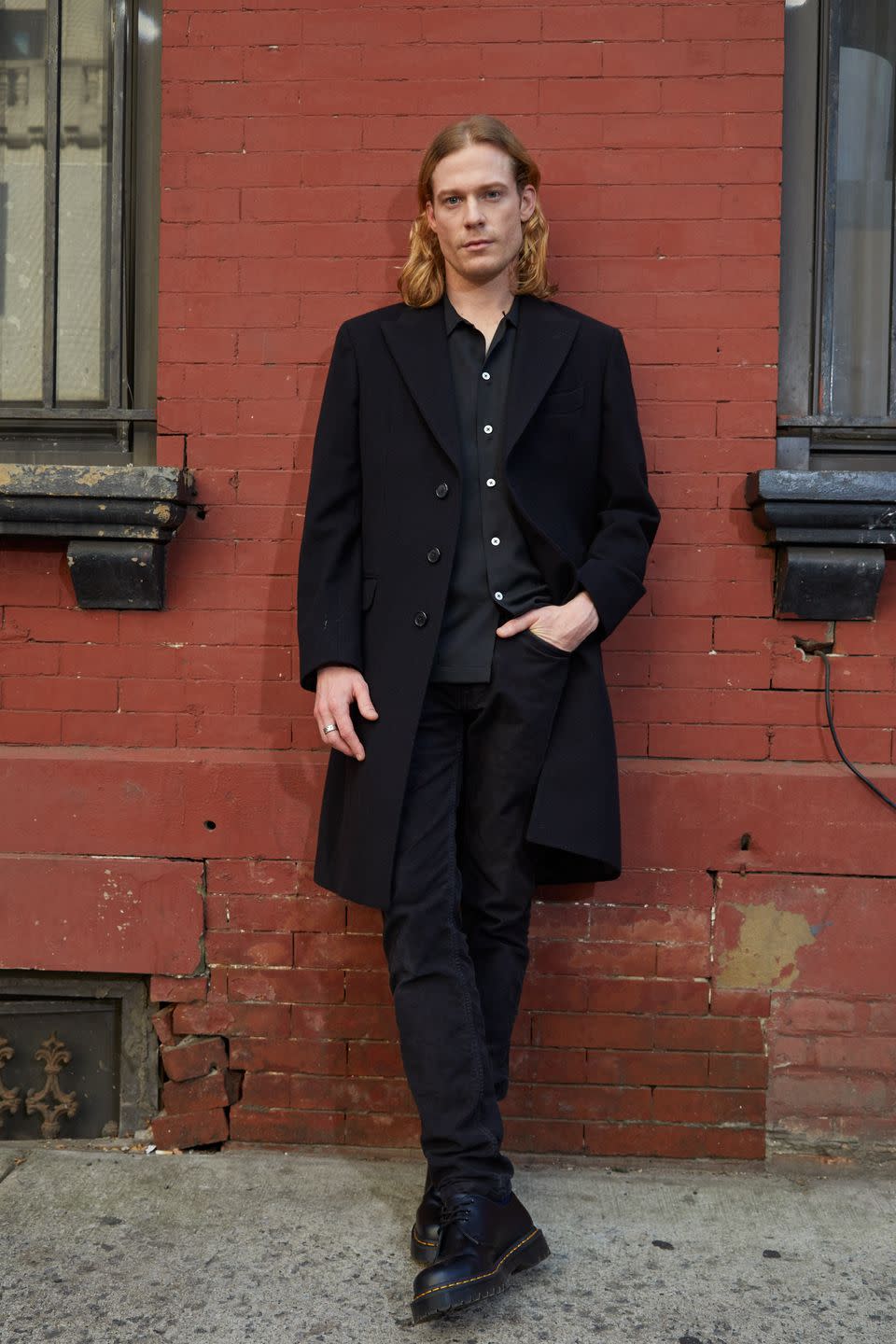
The Vampire Chronicles has a cult following with a joyful, vibrant culture. What does it feel like to be joining something with that sense of longevity and community?
SR: We both love Anne Rice and we've talked about it a lot.
JA: We're talking about Anne Rice at some point every day.
SR: I remember the day that she passed away. I went down to the Garden District Bookshop in New Orleans where she did all her book openings—she’d turn up to those book openings in a hearse and a bridal gown. Just the legacy that that lady has across the whole city—a literary legacy, but also the Gothic legacy. She’s formed a type of identity that people can carry around: "I'm an Anne Rice reader.” It's just so exciting to be a part of it. I hope that her readers will accept us.
Did you have a chance to spend any time with Anne Rice?
JA: Sadly not.
SR: Very, very sadly not.
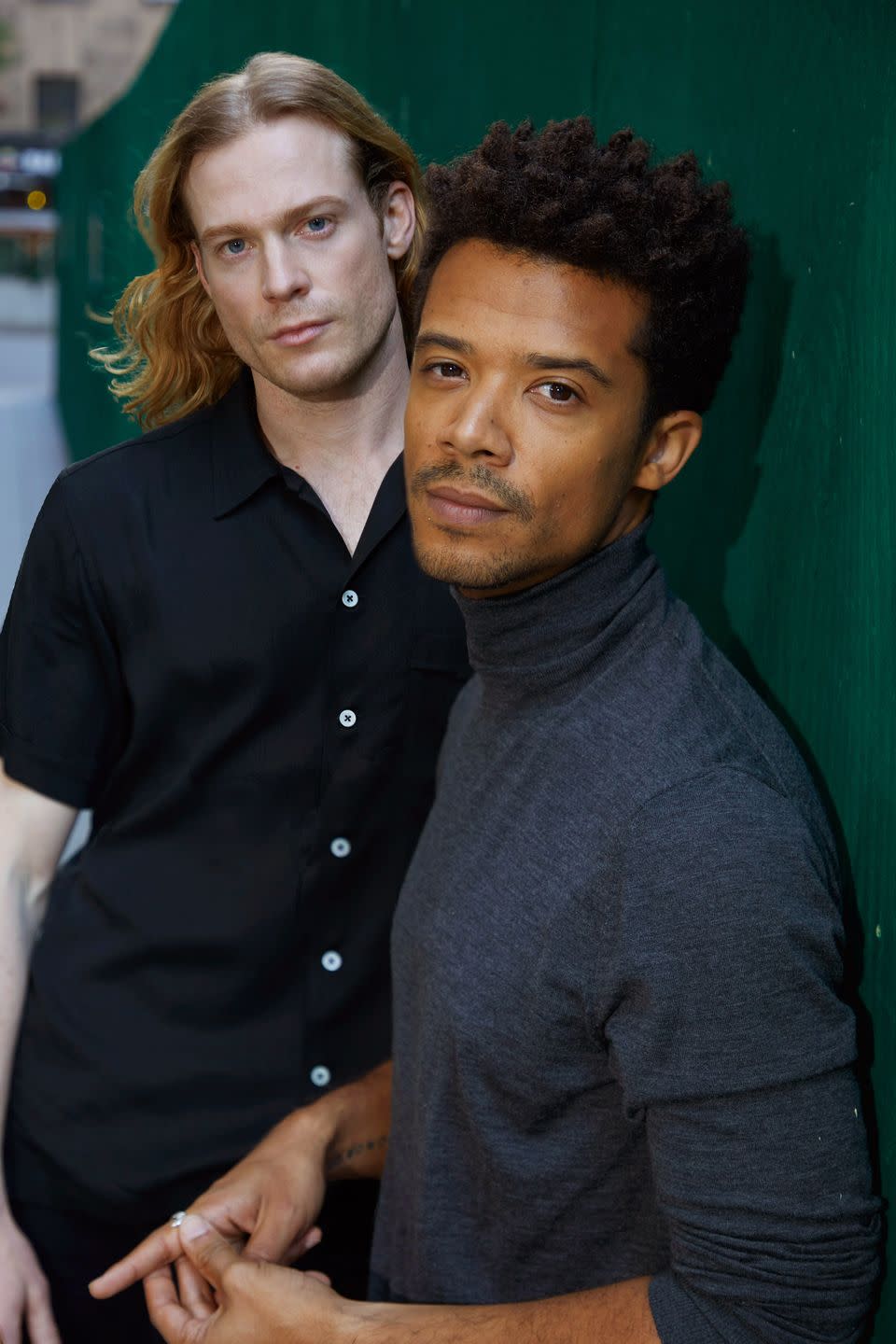
You say you want to be accepted by this community of devoted readers. Did you feel any apprehension or intimidation about that?
JA: Of course. It would be na?ve not to. I had nerves about the fact that in the books, Louis is described as a Caucasian Creole man. Unlike Sam, I didn't come to the books until I came across the show, so I was reading him as a Black Creole man anyway, but that definitely gave me cause for worry at first. Then we started the project and I got to experience falling in love with Anne Rice’s writing just before we were shooting. I think there are certain things that Louis being a Black Creole man from New Orleans really if not adds, then opens up other possibilities that feel completely true and right to this world, and to what she wrote about and where these characters exist.
In the books, Louis was obviously a plantation owner. In our story, Louis comes from a family that owned plantations. I'm not going to say, "Good for you people that really wanted him to be a plantation owner." But given the time period that Rolin's chosen for this interpretation, it would be strange for him or Claudia not to be people of color in New Orleans.
As you were reading these other books, did you ever find yourself thinking, "Lestat is behaving this way because of something that happened in one of the prequel books”?
SR: 100%. With Lestat, his entire backstory is there. We're not changing that, so we definitely brought all of those elements into it. Going back to that idea of pressure—I've been a fan of these books for a long time. That adds a pressure I put on myself, which is, "Will I be able to live up to my own love of this character?" That’s almost worse than the pressure I feel about how someone else will receive it.
But we do have all of those books to keep going back to, and Rolin is insanely clever in terms of going back and referencing things. I have one line that seems like such a throwaway line in a scene that you wouldn't even think about. Luckily I knew the deeper meaning. There’s heaps of them in every scene—lines where you think, "That wouldn't mean anything," but it all means something, because Lestat is talking about a real life that exists over a series of books that you can continue to draw from. It's so much fun. Everything has a place and a meaning.
JA: I had only read the first two books when we started shooting; now I’ve read beyond that. When we talk about the books, we get excited about how things slightly change based on our interpretations of these characters, but also how similar they are in ways that I wasn't aware of before, because I hadn't read past the second book. I didn't know how faithful Rolin was being to things that happened beyond The Vampire Lestat. There are things in the future, specifically about Louis's fate, that become especially exciting with that new context.
This is the best way to do a literary adaptation. If you know the source material, then there's all that richness. If you don’t, you can still enjoy it, and maybe even be led to discover the books.
SR: That would be the best thing—for this to inspire a whole new generation of people to go back to those books. I definitely think there should be a resurgence of Anne Rice every couple of years, and hopefully we will inspire that.
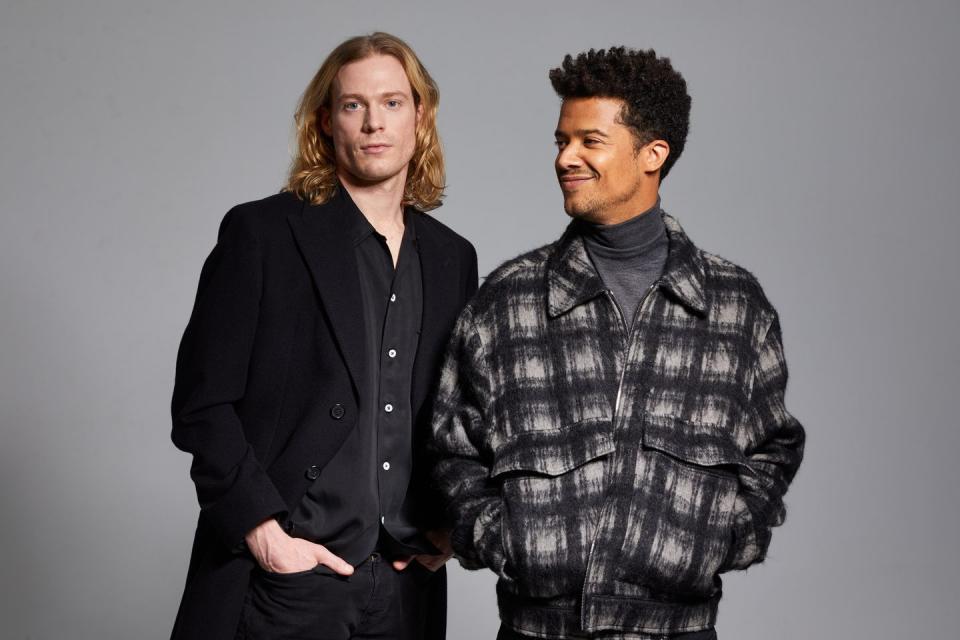
We’ve been telling vampire stories for hundreds of years. Why do we keep coming back to them?
JA: I think there's something about living in the shadows that connects to our own darkness and our own desires. It also connects to the things that we're ashamed of, because vampires have to hide. It's a lonely existence, but they so crave contact and connection and intimacy. There’s a human impulse there. The things we fear about ourselves burst out in these bits of impulse or despair or torture—it’s irresistible, because it speaks to something that we don't really talk about. There's something about vampires that feels sordid, but they’re intensely human.
SR: Whether it's Dracula or Nosferatu or Louis and Lestat, vampires are always yearning for love. The key themes to which they’re always connected are death, which everyone has a certain relationship with, and sex. These are constants throughout life and vampires speak to that, but other monsters, they can speak. They're very articulate creatures.
I think Anne Rice really made vampires what they are today. Bram Stoker obviously created this concept of the yearning, articulate, beautiful vampire, but we never saw that story from his perspective. When Anne Rice puts the perspective into the mind of the monster, you learn that these creatures are incredibly articulate, thoughtful, and questioning—they’re in agony, in love, frustrated with their own demonic personalities and their own drive to be bad. It's this whole psychological spectrum that we can relate to. As an audience member or as a fan of vampires, you can feel seen through the eyes of a monster. You look at yourself and wonder, "Am I doing the right thing? Am I a good person? Am I a bad person?" In terms of monsters, there's nothing really like the vampire. That's why it transcends and has lasted so long. People want to see them because it's a fun feeling, being able to relate to a mythical creature in such a profound way.
You Might Also Like